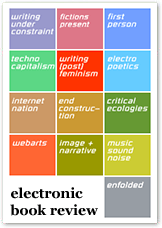ebr
 | |
| Editors | Sandy Baldwin, Davin Heckman, Eric Dean Rasmussen |
|---|---|
| Categories | Culture, Literature, Technology |
| Founder | Joseph Tabbi, Mark Amerika |
| First issue | 1995 |
| Country | International |
| Language | English |
| Website |
www |
Electronic Book Review (ebr) is a peer-reviewed scholarly journal with emphasis on the digital. Founded in 1995 by Joseph Tabbi and Mark Amerika, the journal was one of the first to devote a lasting web presence to the discussion of literature, theory, criticism, and the arts.
Overview
Since its inception, ebr has highlighted works characterized by innovation, resistance to genre, and creative use of emerging (electronic and web-specific) media. In 1996, Details referred to the journal as "a new mecca for cutting-edge fiction and criticism."[1] Initially managed in DIY fashion by contributing writers and programmers, by 1997 Anne Burdick joined the staff as design director, later bringing on Ewan Branda for the redesign.[2] Writing in Deep Sites: Intelligent Innovation in Contemporary Web Design, Max Bruinsma characterizes ebr as "an interesting web of critical debates on electronic textuality, cyberculture, and the value of digital design literacy for scholarship and critical writing on the web."[3] Its emphasis on the materiality of text extended to early experiments with form on the site itself, including "glosses," in which comments by a guest curator appear embedded in existing articles, and the "weave" function, which allowed for fluid rearrangement of content "like a virtual loom that weaves different patterns each time you choose a different perspective."[4]
ebr has received institutional support or affiliation from University of Illinois at Chicago,[5] The Center for Literary Computing at West Virginia University,[6] University of Colorado at Boulder[7] Department of English, Art Center College of Design at Pasadena,[8] University of Stavanger,[9] Electronic Literature Organization,[10] and Consortium on Electronic Literature (CELL).[11] The journal has also enjoyed a long association with distributed literary networks such as Alt-X and the Open Humanities Press, the latter "an international, scholar-led open access publishing collective whose mission is to make leading works of contemporary critical thought available worldwide."[12]
Books and Collaboration
In conjunction with a trilogy of essay collections from MIT Press, ebr published a thread reproducing a portion of the essays while also expanding, critiquing, and responding to the print content. The "First Person" thread[13] exists as an accompaniment to the collections First Person: New Media as Story, Performance, and Game, Second Person: Role-Playing and Story in Games and Playable Media, and Third Person: Authoring and Exploring Vast Narratives by Pat Harrigan and Noah Wardrip-Fruin.
Contributors
Notable contributors include:
- Marjorie Perloff
- Joseph McElroy
- J. Hillis Miller
- Stephanie Strickland
- Matthew Kirschenbaum
- Florian Cramer
- Michael Bérubé
- Cary Wolfe
- N. Katherine Hayles
See also
References
- ↑ Spillman, Rob (December 1996). "Bibliofiles: Web crawling for bookworms". Details (December 1996): 144.
- ↑ Hunter, Allison. "Weaving the Web". How Magazine. How Magazine. Retrieved 10 September 2015.
- ↑ Bruinsma, Max (2003). Deep Sites: Intelligent Innovation in Contemporary Web Design. New York: Thames and Hudson. p. 143. ISBN 9780500283844.
- ↑ Bruinsma, Max (2003). Deep Sites: Intelligent Innovation in Contemporary Web Design. New York: Thames and Hudson. p. 143. ISBN 9780500283844.
- ↑ •, Bwilli7. "Electronic Book Review (ebr) - Digital Humanities @ UIC". Retrieved 2015-09-25.
- ↑ News, University Relations |. "WVU to host prestigious web-based, peer-reviewed journal". Retrieved 2015-09-25.
- ↑ "CU-Boulder A to Z | University of Colorado Boulder". www.colorado.edu. Retrieved 2015-09-25.
- ↑ "About EBR | Electronic Book Review". www.electronicbookreview.com. Retrieved 2015-09-25.
- ↑ "University of Stavanger - Norway - Electronic Book Review". www.uis.no. Retrieved 2015-09-25.
- ↑ "Partners | Electronic Literature Organization". eliterature.org. Retrieved 2015-09-25.
- ↑ "Electronic Book Review | CELL Project". cellproject.net. Retrieved 2015-09-25.
- ↑ "About page". Open Humanities Press.
- ↑ "First Person". Electronic Book Review.